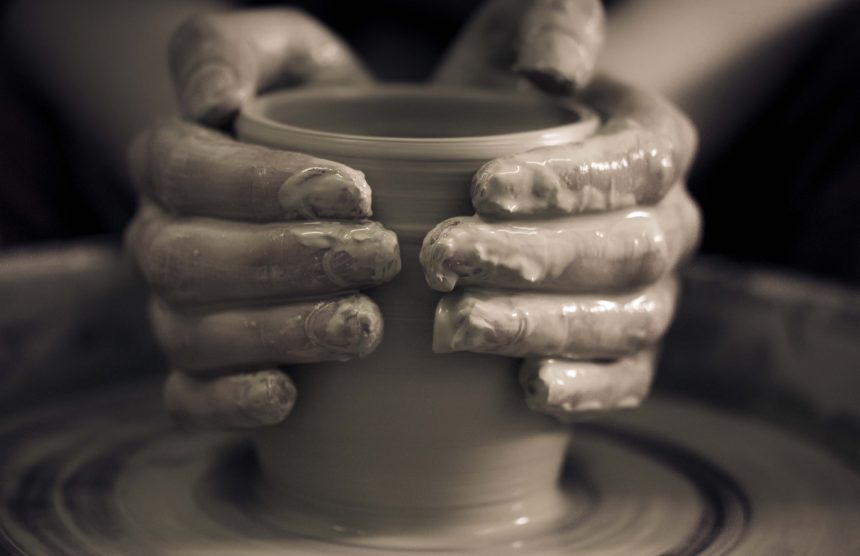When my kids were little, a favorite activity in our house was playing with playdough. They loved to squish, pound, mold and shape the soft, fragrant clay into works of art. The problem with the playdough was that although the kids loved to play with it, they were not very good at putting it back in the containers when they were done, nor would they close the lid completely. The clay would become hard and brittle and totally unusable. Gone was the fun, and now it was simply tossed into the garbage.
Isaiah 64:8 (NIV) tells us that we are clay:
“Yet You, Lord, are our Father. We are the clay, You are the potter; we are all the work of Your hand.”
The purpose of clay is to be shaped and formed into a vessel for use. God is the Potter; He is in the process of shaping us and forming us into a vessel He designs. It is His choice. We, as clay, are to remain moldable and soft, allowing Him to do the forming.
Life can make us hard. How do we keep our hearts soft so that God can continue to shape us into the women He wants us to become? We know we want to be more like Christ, but how do we do that? Using the word “CLAY,” we apply four things from Isaiah 64:1–8 to show how we can keep our hearts soft and moldable in the Potter’s hand.
C—Celebrate what God has done in the past. Isaiah’s words in verses 1–3 bring to mind some of the miraculous things God had done in the past for the Israelites: the amazing Exodus from Egypt, the provision in the wilderness and the delivering of the Law.
To keep our hearts soft, we need to remember how God has acted in the past. We need to celebrate His past faithfulness, answered prayers, miraculous protection and provision. Praise Him for what He has done previously in your life. Failing to celebrate how God has worked in our lives in the past can lead to the hardening of our hearts. As we remember what God has done, we should expect that He will continue to do awesome things now and in the future.
L—Live God’s Word. This means we are obeying God’s Word. In verses 4-5, Isaiah gives three specific ways we are to live and obey God’s Word. First, He writes that God acts on behalf of those who wait for Him. Waiting on God for His direction and His timing is a key part of obedience. Waiting involves trusting God and expecting Him to work out all the details. It is easy to run ahead of God and do our own thing, but part of obeying is to stop and be still when God says wait.
In verse 5, Isaiah writes about two more things we need to do to live God’s Word: gladly do right and remember God’s ways. Obedience requires action. When God’s Word tells us to do something, our response should be to obey, not grudgingly, but with a heart filled with gladness. Remembering His ways are demonstrated as we live out the instructions He has given in His Word.
A—Admit your sin. Verses 6 and 7 remind us that we are sinners. No matter how long we have walked with God, we are still sinners, and all our righteous acts are like filthy rags. We always need a Savior. Unconfessed sin hardens our hearts. As we read and live God’s Word, areas of sin in our individual lives will be revealed. We must always acknowledge and confess our sins to the Lord.
No one will ever get obedience down perfectly. There will be times when we disobey. When we do, we need to immediately confess our sin and ask God for forgiveness, and then ask Him to help us to continue to obey (especially when we don’t feel like it).
Y—Yield to the Potter’s shaping. Finally, we need to be willing to be clay. In verse 8, Isaiah is acknowledging that God, our Father, is the potter and we are not. In driving, the yield sign means to let other road users go first. A yield sign assigns the right–of–way to traffic going in a different direction. To yield to God means He has right–of–way in our lives. To yield to God means we are putting aside our agendas, dreams, desires, rights and doing what God wants us to do instead.
We are only the clay; that means we allow God to shape, mold and (when necessary) pound us into who He desires us to be. At times this can be painful, but less so when we say, “Yes, Lord, to Your will and to Your way.”
We have a wonderful Master Potter, who knows what is best in order to shape us into who He wants us to be. Our job is to remain soft and moldable and let God do the shaping. May our prayer be: “Lord, You are the potter, I am the clay.” (You can find the words and music on the Internet.) May we remember that we need to always trust the Lord, knowing that we can rest in Him and that His way is always best even when we don’t understand.
I need to trust and obey,
And accept whatever You allow to come my way.
May my heart be soft and pliable,
Fully and completely yielded and agreeable.
Trusting Your way really is the best,
No need fretting, I can simply rest.

